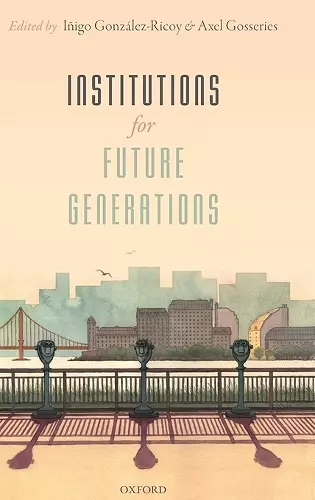Institutions For Future Generations
Iñigo González-Ricoy editor Axel Gosseries editor
Format:Hardback
Publisher:Oxford University Press
Published:22nd Dec '16
Currently unavailable, and unfortunately no date known when it will be back

In times of climate change and public debt, a concern for intergenerational justice should lead us to have a closer look at theories of intergenerational justice. It should also press us to provide institutional design proposals to change the decision-making world that surrounds us. This book provides an exhaustive overview of the most important institutional proposals as well as a systematic and theoretical discussion of their respective features and advantages. It focuses on institutional proposals aimed at taking the interests of future generations more seriously, and does so from the perspective of applied political philosophy, being explicit about the underlying normative choices and the latest developments in the social sciences. It provides citizens, activists, firms, charities, public authorities, policy-analysts, students, and academics with the body of knowledge necessary to understand what our institutional options are and what they entail if we are concerned about today's excessive short-termism.
This excellent collection of essays is devoted to the diagnosis and especially therapy of what is widely considered a flaw of current Western democracies: shorttermism- i.e., the prioritization of present over future benefits. [...] All in all, the contributions in this book are original, instructive, and exciting to read, especially given the urgency and seriousness of the subject matter. * Vuko Andric, Universität Bayreuth, Erkenntnis *
wIñigo González-Ricoy and Axel Gosseries, the editors, deserve much praise from the outset for their laudable service of putting together what is (to my knowledge) the latest and to date perhaps most comprehensive volume on institutional responses to the widespread problem of "short-termism". ... this volume does an excellent service to students and scholars of intergenerational justice alike, and one can only hope that it will find many vigilant and engaged readers. * Markus Rutsche, Intergenerational Justice Review *
Excellent collection of essays ... the contributions in this book are original, instructive, and exciting to read, especially given the urgency and seriousness of the subject matter. The introduction and the contributions in part two equip the reader with the knowledge necessary to form a qualified opinion on the institutional changes proposed in parts three and four. Moreover, as I have argued, there is at least one package of proposed changes that promises to remedy short-termism and brings along other gains in terms of democracy and justice. * Vuko Andric, Erkenntnis *
Perhaps the main flaw of democratic governments is that periodical elections induce a short time horizon and make it politically risky for governments to undertake projects that take a long time to mature. Measures for climate change abatement are the paradigmatic case. Even worse, in many modern governments, the actual and expected turnover of ministers is so high that their time horizon is truncated over and above the normal shortening effect produced by the electoral cycle. This path-breaking volume is the first to address this issue in its full depth and complexity. * Professor Jon Elster, Columbia University *
One of the most important issues we face today is whether, to what extent, and how to address the interests of future generations. Much of the philosophical literature has considered this issue only from the perspective of moral principles. This excellent collection, with essays by leading scholars, considers the issue from the perspective of institutional design. The proposals ranging from a world climate bank to youth quotas on representative bodies to the management of pension funds -- are innovative, well considered and important. This volume will be of value not only to philosophers, but also policy analysts, economists and, indeed, anyone concerned with the quality of the lives yet to come. * Professor Debra Satz, Stanford University *
The short-sightedness of elected governments is easily lamented. The hard part is figuring out what to do about it. This book represents the most systematic consideration to date of the prospects for designing political institutions to induce more future-oriented policymaking. The volume combines sharp analysis of the sources of short-termism in democratic politics with careful evaluation of institutional devices that might correct democracy's biases toward the present. Blending normative theory with political, psychological, economic, and legal analysis, this book offers a wide-ranging and thought-provoking exploration of one of the deepest challenges of democratic governance. * Professor Alan M. Jacobs, University of British Columbia *
ISBN: 9780198746959
Dimensions: 239mm x 169mm x 29mm
Weight: 778g
450 pages